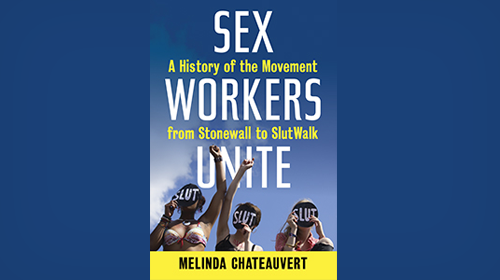
Melinda Chateauvert will read excerpts from Sex Workers Unite! and sign copies of the book on Wednesday, March 12. For more information and to RSVP, visit http://sexworkersunite.eventbrite.com.
Do sex workers have rights? Put another way, can whores, hustlers, strippers, streetwalkers and porn stars demand respect and justice?
The idea that people who trade sex for money, drugs or survival should enjoy civil rights or liberties deeply divides public opinion. The ACLU position holds that laws against prostitution violate “the right of individual privacy because they impose penal sanctions for the private sexual conduct of consenting adults,” but the suggestion that sex workers themselves possess other basic rights is controversial.
For example, many citizens believe that “public women” (an old term for prostitutes) should not be allowed to work on public streets. Numerous cities have created “prostitution-free zones” that permit the police to target undesirables, forcing them to “move along” through arrest, prosecution, and banishment as a condition of probation; in Phoenix, women arrested for offending “public morals” are sent immediately to a church-operated “prostitution diversion” program and prohibited from speaking to an attorney.
In several states, sex workers convicted of felonies must register on public sex offender lists—making them vulnerable to stalking and harassment. One Virginia assemblyman recently introduced a bill that would allow law enforcement to seize the assets of any person arrested for prostitution.
Stigmas against sex work and sex create this hostile environment. Clients—specifically heterosexual males—have become new targets for public humiliation, with legislatures in several states proposing laws that levy steep fines, even prison terms, for those who choose to pay for sexual services. In practice, these laws actually endanger sex workers more. Clients who fear arrest may refuse to negotiate openly, or react violently when they feel threatened. Sex workers, concerned about self-incrimination, rarely report crimes committed against them.
Public harassment and misconduct by law enforcement are some of the dangerous consequences of client criminalization, prostitution-free zones and other laws against sex work.
Chicago police have arrested transgender women—particularly African American and Hispanic transwomen—for “buying” rather than “selling” sex and charged them with felonies, while simultaneously “proving” that they are arresting both “men” and “women.”
Even more chilling for public safety, US Department of Justice investigations of several police departments revealed patterns of systemic violence against street-based sex workers. Police officers have been convicted on charges that include the kidnapping, rape and sexual exploitation of “suspected” prostitutes; homicide detectives have conducted haphazard and careless investigations of serial murders when the victims are, or are perceived to be, sex workers.
Despite limits on “stop-and-frisk” policing in New York City, sex workers, especially young transwomen of color, are still routinely stopped. Though New York has no law against carrying condoms, police use possession of three or more condoms as grounds for arrest on suspicion of intent to engage in prostitution—a practice that goes against all the logics of harm reduction. Police departments in San Francisco, Washington, DC and elsewhere have similar policies.
The myriad federal, state and local laws against prostitution mean that “rights for sex workers” will require more than decriminalizing sex for money or other consideration.
Sex workers are human beings with the right to self-determination. It’s time for policymakers, the courts and law enforcement to recognize they are equally deserving of the civil rights, civil liberties, and above all human rights accorded to the rest of us.
Learn more about sex workers' rights and other civil liberty issues: Sign up for breaking news alerts, follow us on Twitter, and like us on Facebook.

